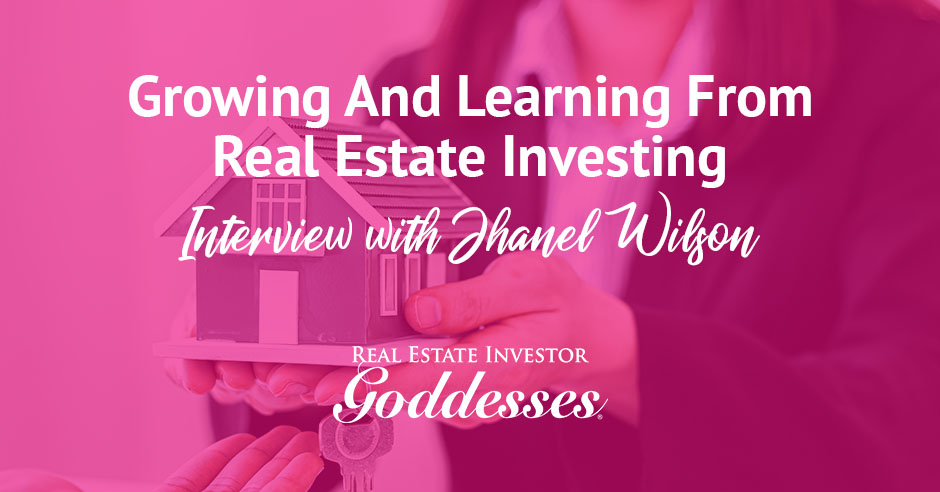
The male-dominated field of real estate is often a tricky world to navigate. However, more and more women are beginning to enter this world and learning from real estate investing. In this episode, Monick Halm talks to the Founder and CEO of The Savvy REI, Jhanel Wilson. Jhanel shares her humble start in real estate—saving her father’s property. She also shares insights on what she’s learned in managing rental portfolios and gives tips for women who wish to be leaders and entrepreneurs. An episode you will not want to miss, especially if you are about to start investing.
—
Watch the episode here:
Listen to the podcast here:
Growing And Learning From Real Estate Investing With Jhanel Wilson
I am super excited to be interviewing, who has been investing in real estate. While being a Chemical Engineer, she began investing in real estate at the tender age of 22. She has her engineering career not only to fuel her investing but also to give her confidence working in a male-dominated field like real estate is. Along with other engineering-related skills, she used them to help her excel her way to an eight-figure rental portfolio, mostly small multi-families in Philadelphia. She’s the Founder and CEO of The Savvy REI with a mission to share her seventeen-plus years of hard lessons and personal strategies to help people understand, master and succeed with real estate investing. Like me, she has the heart to help others get in the game, too, and be successful. I’m super excited to have her. Welcome, Jhanel.
I’m excited. I have been reading this since 2019. It’s an honor to be a guest on here.
I feel very honored. Thank you. I’m so happy to have you.
At the time, I was looking for a show that had women investors on it. I listened to BiggerPockets, which is great but I was looking for a women’s perspective. When I came across it, I was so happy. Thank you for putting it together. I appreciate it. There are women out there who appreciate it. We need to hear more from us.
I’m glad they can hear from you. I know there are a lot of engineers that go into real estate. It’s because it’s such a logical thing to do. Once you know about it, maybe that’s it. What got you started in real estate investing?
What got me started was my dad had duplexes across the street from my grandmother’s house. Whenever we went to visit, I always remember him going across the street and bringing money. I have always been into money. I have been saving coins, wrapping them up and taking them to the bank. It was always on my mind that just across the street are people’s money. As time went on, my dad fell on hard times and let the property became vacant, abandoned and run down. I forgot about it. I lost touch with him and the property. Many years later, when I was in college, my grandmother calls me and tells me that the house has gone up for sheriff’s sale.
I want to save it. I have to come down and find out what I owe on it. I found out that we owed $5,000 in back taxes so I have to do it alone. I paid the back taxes to stop the sheriff’s sale. I went back to school, I forgot about it and I graduated. I started working as an engineer. My grandmother called me again and said that the city is about to tear it down it’s because it has been empty for so long, the roof was bad. Rain does those terrible things to properties. The back wall was collapsing and the joints were rotten. If I didn’t fix the violations, the city was going to tear it down. I did the only thing I knew of. I’ve got a cash advance on my credit card. I don’t recommend doing that. That was all I did at that time.
There's always a way to work things out to each other's benefit. Share on XAs I was down there downtown and they are reading all the violations, I remember thinking that, “I don’t know how I’m going to do this.” I don’t know anything about that. I have enough money but there was a contractor there and he heard a story. He saw me in despair and was like, “I can fix all these things for you.” He fixed all the violations. He was like, “I can do the rest of the work for you.” I was like, “I don’t have money.” I started getting estimates for things and everything was high. I didn’t know what to do. I was like, “Maybe I could sell it and then dump $10,000 in the property.” I don’t have any other resources. My grandmother brought me someone who offered to buy it for $45,000.
I was like, “Do they know the condition?” She said, “Yes.” I was like, “They still want it?” “Yes.” I’m like, “If she wants it, maybe I should keep it. I’m going to figure this thing out.” My mom is a cosmetologist. I was in the shop one day and one of her clients has property around the corner from it. She told me she just got a refinance. They did a drive-by appraisal. She got a loan for $60,000 and I was like, “Drive-by appraisal? That sounds genius. That’s what I’m going to do.” I speckled the outside. I put new windows and doors. I’ve got a drive-by appraisal and I’ve got a loan for $63,000. Unfortunately, there were mortgage liens, booter and other more taxes on it. I want to chop the $45,000 out of the loan but I had just enough. $20,000 at the time seems like cheap rehab. I had enough money left over to fix it up.
I went through the whole gamut of contractor problems. He stopped working on the house and took about eight months to renovate. I was going through it with this property. By the time it was finished, I put two Section 8 tenants in there. It cashflows $700 immediately. That’s a lot of money. They direct deposit to my account. Their portions were $50. I forgot all the drama I have been through. I was like, “I am doing this again. Where is the next property?” That was how I’ve got started. It was a lot of ups and downs but I made it. That house was such a huge challenge, it made me fearless. I have taken on all types of projects since then. Some were too big for my purchase but I survived them but it prepared me for a lot and it gave me a new perspective about real estate that I’m thankful that I’ve got at a young age and we have been able to capitalize all this time.
Sometimes it’s good to have all those hard challenges out front because it can make you feel fearless or at least you are like, “I survived this and this. I can survive anything.” The easy deals are so easy.
Single-family, I can do that in a week but because I was young, I didn’t have any kids and a lot of stressful responsibilities, I can take on those things and learn it at a young age. Now, for the first time with all the responsibilities I have and other stresses in life, it’s different. I was fortunate to start early. I could focus on and let that one thing stress me out.
Anybody can start. It’s knowing that it’s possible. You can get through it. There are ways.
You can but I do recommend for people to start with cosmetic rehab.

Learning From Real Estate Investing: Whether you plan to quit your job and you plan to do anything, planning is always important, and it takes discipline to plan.
Ugly ducklings with good bones.
Good bones and not broken joints or walls collapsing.
None of that stuff. There are certain things that if you fix it up, you will get more money for it and other things, you have to fix it up, it doesn’t give you a penny more. Foundations, structural things, roofs and pipes, all that stuff is not bringing any more money. Kitchens, bathrooms and all those fun things.
I picked his brain about the learning curve. If you are new, then you have all those things and the learning curve is steep and you might get discouraged. I want people to get to their first property and be motivated by how easy it was and all the money that they made, and then start having because they have the extra motivation when they have seen to take on something harder.
Share a little bit about what your focus is now.
I’m at the point where I wanted to take a break but I’ve gotten so good at it. When everyone brings me a deal, I take it because it seems relatively easy but with quarantine, things are very hard to manage with my kids being home. I’m on my last huge fiveplex now. I have started moving into mentoring and doing an online course, which is also new for me. I’m coming out of my comfort zone. My big goal now is learning how to teach, how to put a course together and mentoring, which is pretty hard. Those are most of the things I’m working on.
You had this challenge that you are experiencing now. You are trying to get somebody out, especially in the middle of a pandemic when you cannot get them out. That might be related to my next question, which is, what was your biggest mistake and what did you learn from it? What are you learning from dealing with a squatter? That may or may not be your biggest mistake, why don’t you share?
With every project, there's always some challenge. Share on XI feel like every mistake is a learning opportunity. I don’t welcome them. That’s why I grow in small steps because there’s always something that I don’t know and I understand that. If I make a mistake, it’s because I don’t have experience with it. I don’t feel like he was a mistake. I feel like he’s a rare occurrence. I try to weigh things as far as risk and reward or risk and probability. Whenever I have had a difficult tenant, usually it’s to provide experience to them because I try to always pick reasonable tenants. One of the biggest determining factors is not just can they afford it but are they a reasonable person to make sure we can always work things out, whether there’s some misunderstanding that we work out or if we don’t work it out, you agree to leave.
If not, we do eviction or we do cash for keys. I feel like there’s always a way to work things out to each other’s benefit. With this particular person, he has proven to be unreasonable, which is why it’s not working out. I don’t think it’s a mistake. It’s something that happens. The probability of my experiences with working on getting a tenant out is a fairly good experience. This is something I have to go through because of COVID.
There’s that. I have quite a few tenants that thought eviction moratorium and rent moratorium is thumping rent. You have to take it. That can be part of the process and the challenge of dealing with difficult tenants.
With every project, there’s always some challenge. Although I had had my share of challenges with this one, like my contractor, I have been working with him for ten years and I try to always keep having a pipeline from him. It’s why I get stubborn now. I’ve got a little backed up. He has gone through some personal things and he decided not to do work anymore. I had that going on, and then because of that, I had to go through new contractors, which is a whole other animal. You’ve got to be a lot more involved. They’ve got to know that you are like this because, with him, we already are in our group. We know each other, he knows what I want already. It’s very easy. With new people, you’ve got to learn from each other.
You’ve got to figure out how to work things out when things don’t go right. I had that, and then the squatter guy who was vandalizing property, cutting up pipes. My guys didn’t want to work there anymore. They were in danger. I don’t want to do a lot with this last project but unfortunately, I’ve got it at a good price. It was a COVID deal. I will still be okay even with the losses I have suffered. That comes with buying right. It’s a part of expecting some challenges that happen with every job.
What would you say was your biggest mistake and what did you learn from it?
Honestly, the only mistake that I made is with this one particular job where I didn’t verify everything in the planning stage. I was on fifteen units and we had to get plans and all the people had to be involved. Usually, I read everything, I triple-check because people make mistakes. They copy and paste, and all these different things because I didn’t do that, the plans were wrong. I had to keep getting those setbacks over and over again. It made me realize how important the planning phase is whenever you are doing that construction job. Making sure everything is right up front. Planning, in general, is important. When you plan to quit your job and when you plan to do anything, planning is always important and it takes discipline to plan. It takes discipline to go and read those plans when you don’t want to read them. That was my biggest mistake. I learned that I always need to double-check everybody’s word. You need to know a little bit of everything to know when something isn’t right.

Learning From Real Estate Investing: If the women can put a spin on it and bring our feminine energy and our love and take care of tenants and everyone else, it will be a better place.
What are you most proud of?
I’m most proud of myself now for coming out of my comfort zone, with the teaching, being aligned and doing podcasts. People have been inviting me to speaking engagements, which I would never ever thought I would do in my entire life. I’m an introvert and I like living in my little bubble and if you push me out onto the spotlight, I’m like “Ah.” I know that once I do it over and over again, I will get more comfortable but it’s getting out of the comfort zone that’s uncomfortable. I’m happy that I am making myself uncomfortable, doing it and welcoming anything that comes with it.
You should be proud of it. Public speaking is the biggest fear. More people fear that than death. The fact that you are willing to go out there, that’s huge. To what do you attribute your success?
Being disciplined and motivated. You always need discipline and motivation to carry through things. Carry through ups and downs, always try to look at the bigger picture and be motivated. Real estate is full of ups and downs with tenants, contractors, the city and bureaucracies. How are you going to do all of it? Being successful and happy is a huge feat.
What advice do you have for a woman who’s starting in this field?
I feel like women need to feel like they belong in real estate investing. It has been a male-dominated field for so long but real estate investing is more than the money and the financial bottom line. It involves people. It involves making sure your tenants are taken care of. It involves bettering the community and making sure everyone is benefiting from the whole field in general. It’s not just about the money and I think women care more about that. I had one year where I was working with the GC and we did thirteen projects together.
Through like the sticks one who was like, “I’m only going to work with you for the rest of the year. Even though I make a little bit less money with you, I’m moving into a place in my life where I don’t want to work for a-holes. You are nice to the guys that you are going to work with, you are reasonable. We are going to focus on your projects from now on.” I’m like, “This is great.” I feel like we, as a society are moving towards a place where we want to be appreciated at work. We don’t want to go into a high-pressure situation. If the women can put a spin on it, bring our feminine energy, our love, take care of tenants and everyone else, it will be a better place. There will be no more slumlords because we will make sure you have heat.
You always need to double-check everybody's word. You need to know a little bit of everything just to know when something isn't right. Share on XI love that story. A lot of women think that they have to be super tough and show up as men to be successful. We are so much more powerful when we are in our feminine and we are who we are. They will want to want to work with us, even if they are making less money because it’s so much more pleasant to be working with people who care about you. That’s why more women need to be in the field. I hear so many men say, “I love working with women.” Women love working with women and they will do it even for less money because it’s a more pleasant experience.
I tell women all the time, “You don’t have to act up. They will respect you because you respect them. You keep the jobs and the money going. You are a fair person. There’s more to just be on top that makes a leader. Other things make you a leader. Once you exude this spectrum of people, creativity and other things that you bring to the table, people will naturally expect you. You don’t have to act tough.
What do you wish you had known at the beginning that you now know?
I wish I would have networked sooner. I didn’t realize the importance of networking. What gives you an edge in investing, especially in real estate is information and more people is more information. It helps you make more money and helps you when you get in a bad situation. Networking is important. One of the second things I teach when I’m teaching the people who are taking my course is you have to network. Not just us online.
I need you to get involved in your local RIAs, meet people and learn different strategies, areas and build up your network, people to support you because also, people who are not in real estate investing, have all of all types of bad things to say about it. If you have a problem, they will be like, “You tell it. I will push it out to do that.” If you have a network for people who understand you and real estate investing, you will have a better chance of lasting a lot longer.
Before we get into our famed end of show trinity, which is a brag of gratitude and desire, how can people connect with you and find out more about what you do?
I have a website now that’s a landing page. I sent it to the web designer, JhanelWilson.com. I will be coming out with a lot more guides because I realized the information out here is cookie cutter. It’s not what people need to learn about real estate. I will be putting out some things coming from someone that has been in the game for several years. A lot of this stuff is not sexy. It’s old school, understanding the market, the numbers and learning the fundamentals of investing and people. If you sign up from a landing page, you will get noticed when I have the information, with my courses and stuff like that.

Learning From Real Estate Investing: There’s more to just being tough that makes a leader. There are other things that make you a leader.
It’s time for our famed end of show trinity. What is one thing you are celebrating now? What is your brag? I have heard so many things already for you that you can brag about.
I’m not good at bragging. I’m going to brag about being a great mentor. I’m a badass investor.
What’s one thing you are grateful for?
Now that COVID is somewhat over but I have been seeing a lot of families that I haven’t seen in a year and a half. I’m glad for them that I want them to survive and that we are doing well. People who have their businesses are still going well. I’m happy to see everyone again. We try to pick things up where we left off.
What’s one thing you desire?
A nanny. I have my kids. I’m hoping that once I finished these couple triplexes that it will pay for a nanny.
Shall your desire be or so much better than you can imagine.
Thank you.
Important Links:
About Jhanel Wilson
 While being a full-time chemical engineer, Jhanel began investing in real estate at the young age of 22. She used her engineering career to not only fuel her investing but also, give her confidence working in a male-dominated field. Along with other engineering-related skills, she used them to help her excel her way to an 8 figure rental portfolio.
While being a full-time chemical engineer, Jhanel began investing in real estate at the young age of 22. She used her engineering career to not only fuel her investing but also, give her confidence working in a male-dominated field. Along with other engineering-related skills, she used them to help her excel her way to an 8 figure rental portfolio.
Today, She is the Founder and CEO of The Savvy REI with and on a mission to share her 17+ years of hard lessons & personal strategies to help people understand, master and succeed with real estate investing.
Love the show? Subscribe, rate, review, and share!
Join the Real Estate Investor Goddesses Community today:





